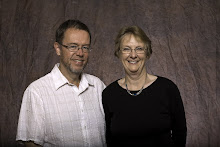"When the day of Pentecost had come, they were all together in one place. And suddenly from heaven there came a sound like the rush of a violent wind, and it filled the entire house where they were sitting. Divided tongues, as of fire, appeared among them, and a tongue rested on each of them. All of them were filled with the Holy Spirit and began to speak in other languages, as the Spirit gave them ability." (Acts 2:1-4)
I have always been fascinated with the scene in Jerusalem, as many people gathered from many places, heard the rush of the wind, and felt something mysterious surrounding them. And I have always struggled a bit with the part of it in which there are many languges spoken and heard simultaneously. Now I have a new understanding and a new experience, maybe not totally like the scene in Jerusalem, but it will forever frame my Pentecost experience.
We live in Lae, a city to which many village people have come to look for work and live. We live on Ampo, the location of the national church headquarters, and many of our colleagues come from far and wide across Papua New Guinea. We attended worship at St. Andrew's Lutheran Church on Ampo on Pentecost Sunday and read the familiar text that was being read around the world in Lutheran churches everywhere. When the pastor began his sermon, he said "good morning" and we all responded "good morning". Then he said, "turn to someone next to you and say 'good morning' in the language of 'your place'". I turned to a young man and said "good morning" in English; he responded in Kote. I didn't understand him but I asked him where he was from and what was his language. Kote is the language spoken in the area north/northeast of Lae, in the Finschhafen area. It is likely that 15-20 native languages were spoken in just this little exercise on a Sunday morning of sharing "good morning". It created a buzz that could indeed be "bewildering" to the outsider.
There are said to be 800 languages in Papua New Guinea. I have heard Yabin sung; I have heard chants from Simbu; I have heard "good morning" in Kote. I have heard others but have not known from which village. This is a place where the natural tongue is the languge of the village. Pidgin (Tok Pisin) is a created language that has helped missionaries and people from villages to communicate with one another. And English is the official language. So, on any given morning, you might hear many languages spoken and sung, and yet, as one respected pastor has shared with us, "it is the gospel that has brought us all together".........and it is the gift of the Holy Spirit that enters us, moves us, and calls us to go forth into the world and into ministry.
Saturday, May 29, 2010
Subscribe to:
Post Comments (Atom)

No comments:
Post a Comment